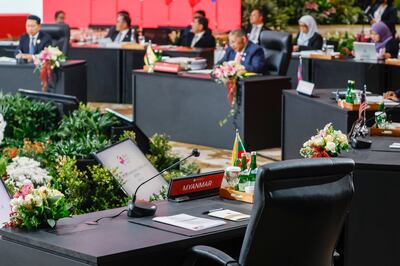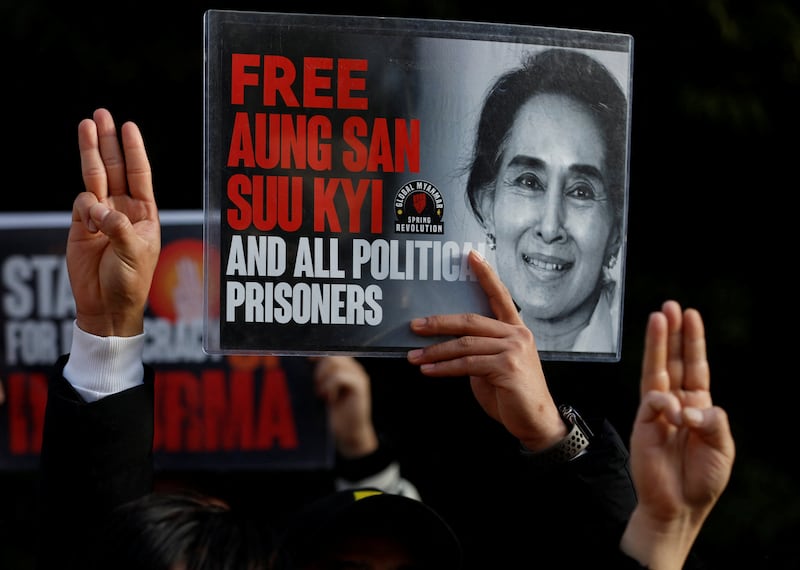Just over two years since Myanmar’s armed forces, the Tatmadaw, overthrew the duly elected National League for Democracy (NLD) government headed by Aung San Suu Kyi, the country is in a perilous state. The UN estimates that 4.5 million people need life-saving humanitarian support, almost half the population are living in poverty, reversing all the development gains made since 2005, and at least 1.5 million have been displaced. The Burmese scholar Win Myo Thu recently wrote: “Myanmar’s military has gone beyond repression or terrorising ethnic minority groups – it is making war on society as a whole.” The entire country, he concluded, “is now a conflict zone”.
Yet, this disastrous ongoing crisis appears to have gone off the international radar. True, the UN Security Council did adopt a resolution on Myanmar – its first for 74 years – at the end of last year, which called for an immediate end to all forms of violence, the release of all arbitrarily detained prisoners, including Suu Kyi, and urged constructive dialogue and reconciliation and the implementation of the peace plan formulated by the Association of South-East Asian Nations (Asean), to which the country belongs.
However, the UN’s own Special Rapporteur for Myanmar, Thomas Andrews, immediately said the wording didn’t go anywhere near far enough. “Demanding that certain actions be taken without any use of the Security Council’s Chapter VII authority, will not stop the illegal Myanmar junta from attacking and destroying the lives of the 54 million people being held hostage,” he said in a statement. “What is required is action.”
Myanmar’s neighbours China and India both abstained in the vote, as did Russia, which has been supportive of coup leader Senior General Min Aung Hlaing, while the Burma Campaign UK’s director, Mark Farmaner, complained that “the supply of arms doesn’t even get a mention in the resolution”, adding that a global arms embargo ought to have been a “no-brainer first step”.

Perhaps a world that is much preoccupied with other matters has looked to Asean to take the lead. The junta did agree to an Asean “five-point consensus” two months after the coup, but then completely ignored its main demands such as ending violence and facilitating dialogue between all parties. In response to the lack of progress, Asean has banned the country’s generals from regional meetings since August 2022. Last week, Malaysian Prime Minister Anwar Ibrahim said that the grouping “should carve Myanmar out for now”, which many took to mean suspending its membership.
A key rationale for allowing Myanmar to join Asean in 1997 was that it might encourage the generals, who were then in charge, to take the path towards democracy and pluralism. Given that all the reforms have been discarded in favour of an even more brutal military dictatorship, suspension would be a just rebuke.
Indonesia, Asean’s current chair, may be taking a different approach, with President Joko Widodo’s right-hand man, former four-star general Luhut Pandjaitan, tipped to be appointed the association’s special envoy for the country. The suggestion is that a fellow member of the top brass might be best-placed to explain the advantages of Indonesia’s move from being a military-led autocracy under Gen Suharto from 1966 to a democracy in 1998. But Myanmar’s generals cannot understand why Indonesia’s army gave up its privileged “dual function” of guarding the country and dominating politics and the economy. “The Tatmadaw regards that decision as an incomprehensible error,” said Aaron Connelly of Singapore’s International Institute for Strategic Studies.
The situation in the two countries is not analogous in any case. In fact, apart from a brief period of democracy from independence in 1948 until 1962, when Gen Ne Win took over in a coup, the military has always held on to the levers of power – as it continued to do under the 2008 constitution, which left the ministries of home, border affairs and defence and one of the two vice president posts under the Tatmadaw’s control.
It is worth remembering that for many of those decades, the West and its allies did not object too strenuously to this arrangement. Gen Ne Win’s “Burmese Way to Socialism” ideology may have impoverished the country and reduced parts of it to a police state, but, crucially, he was not aligned to the Communist bloc during the Cold War. I have never forgotten a Malaysian cabinet minister from the 1970s telling me: “Ne Win was our friend.”

It was because of the Tatmadaw’s centrality to the country that some argued, before the 2008 constitution and the supposed “roadmap to democracy” announced in 2003, that they had to be a part of the solution. Almost certainly because her assassinated father, Myanmar’s independence hero Aung San, was considered to be the founder of the Tatmadaw, his daughter Suu Kyi has often sounded curiously fond of the institution, if not of the officers who have jailed her time and again, talking of it sometimes as if it was a wayward son.
However, after the 2021 coup and the thousands of deaths for which the Tatmadaw are responsible, as well as what most consider to be their genocidal actions against the ethnic minority Rohingya, it would seem even more unpalatable to negotiate a new settlement with them. But what is the alternative?
Mahn Win Khaing Than, prime minister of the National Unity Government that opposes the junta, said in January 2022 that the solution was total revolution. “Everyone understands now that the military has to be eradicated,” he said. All the country’s many ethnic minorities had come together, he said, and “we would have won a long time ago if they [the Tatmadaw] didn’t have an air force”. Victory, he promised, would be “by the end of this year”.
That hasn’t been the outcome, and probably won’t be anytime soon and no outside power has the appetite for military intervention.
“The country will have to suffer for several decades to come if we don’t win this fight,” was Mahn Win Khaing Than’s bleak prediction a little more than a year ago. That may be true, too. But just because the outside world doesn’t know how to help Myanmar avoid that fate – as it really didn’t have a way to overturn military rule before – is not a reason to forget about it. Don’t let this tragedy disappear from our horizons.





